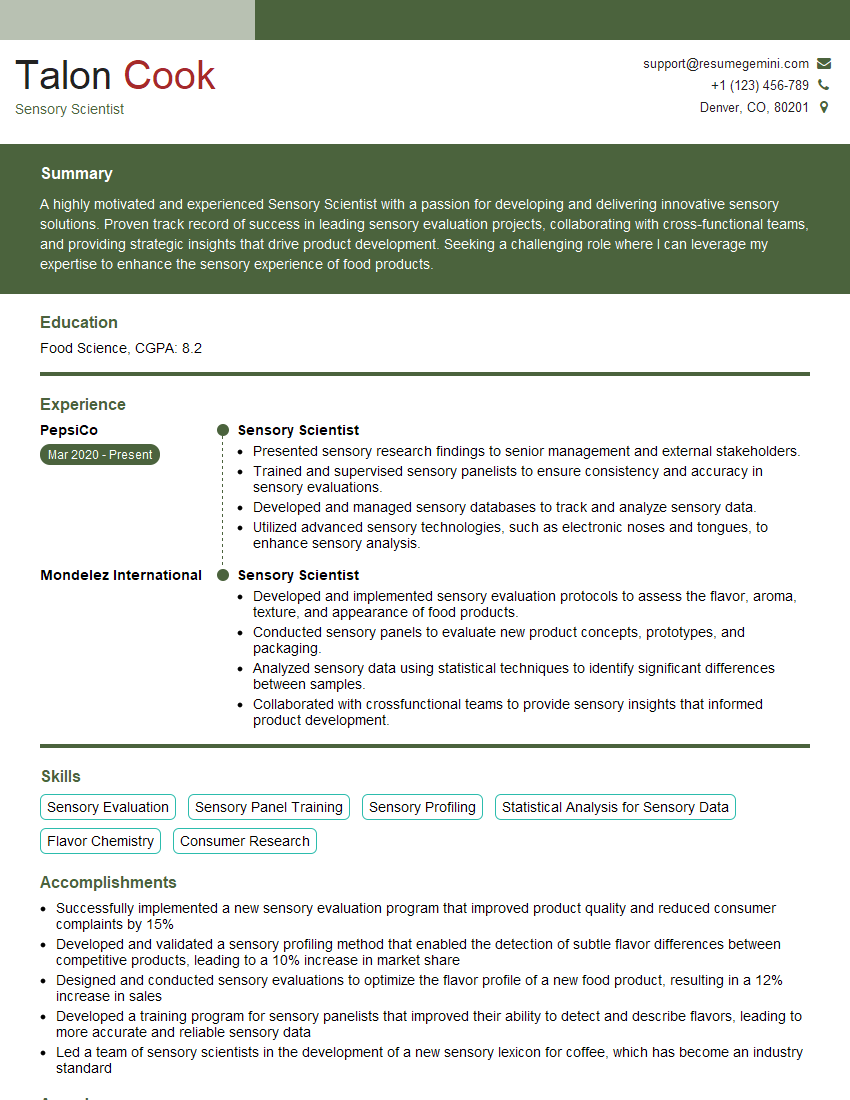Are you a seasoned Sensory Scientist seeking a new career path? Discover our professionally built Sensory Scientist Resume Template. This time-saving tool provides a solid foundation for your job search. Simply click “Edit Resume” to customize it with your unique experiences and achievements. Customize fonts and colors to match your personal style and increase your chances of landing your dream job. Explore more Resume Templates for additional options.

Talon Cook
Sensory Scientist
Summary
A highly motivated and experienced Sensory Scientist with a passion for developing and delivering innovative sensory solutions. Proven track record of success in leading sensory evaluation projects, collaborating with cross-functional teams, and providing strategic insights that drive product development. Seeking a challenging role where I can leverage my expertise to enhance the sensory experience of food products.
Education
Food Science
February 2016
Skills
- Sensory Evaluation
- Sensory Panel Training
- Sensory Profiling
- Statistical Analysis for Sensory Data
- Flavor Chemistry
- Consumer Research
Work Experience
Sensory Scientist
- Presented sensory research findings to senior management and external stakeholders.
- Trained and supervised sensory panelists to ensure consistency and accuracy in sensory evaluations.
- Developed and managed sensory databases to track and analyze sensory data.
- Utilized advanced sensory technologies, such as electronic noses and tongues, to enhance sensory analysis.
Sensory Scientist
- Developed and implemented sensory evaluation protocols to assess the flavor, aroma, texture, and appearance of food products.
- Conducted sensory panels to evaluate new product concepts, prototypes, and packaging.
- Analyzed sensory data using statistical techniques to identify significant differences between samples.
- Collaborated with crossfunctional teams to provide sensory insights that informed product development.
Accomplishments
- Successfully implemented a new sensory evaluation program that improved product quality and reduced consumer complaints by 15%
- Developed and validated a sensory profiling method that enabled the detection of subtle flavor differences between competitive products, leading to a 10% increase in market share
- Designed and conducted sensory evaluations to optimize the flavor profile of a new food product, resulting in a 12% increase in sales
- Developed a training program for sensory panelists that improved their ability to detect and describe flavors, leading to more accurate and reliable sensory data
- Led a team of sensory scientists in the development of a new sensory lexicon for coffee, which has become an industry standard
Awards
- Recipient of the Sensory Science Society of America (SSSA) Best Paper Award for Development of a Novel Sensory Evaluation Method for Dairy Products
- Winner of the International Organization for Standardization (ISO) Sensory Analysis Working Group Award for Excellence in Sensory Science
- Recognized by the American Society for Testing and Materials (ASTM) for exceptional contributions to the field of sensory science
- Recipient of the Society of Sensory Professionals (SSP) Service Award for dedication to advancing the profession of sensory science
Certificates
- Certified Sensory Scientist (CSS)
- Certified Sensory Evaluator (CSE)
- Sensory Science Fellow (SSF)
- Professional Member of the Sensory Science Society (MSSS)
Career Expert Tips:
- Select the ideal resume template to showcase your professional experience effectively.
- Master the art of resume writing to highlight your unique qualifications and achievements.
- Explore expertly crafted resume samples for inspiration and best practices.
- Build your best resume for free this new year with ResumeGemini. Enjoy exclusive discounts on ATS optimized resume templates.
How To Write Resume For Sensory Scientist
- Highlight your technical skills and experience in sensory evaluation.
- Showcase your ability to design and execute sensory experiments.
- Quantify your accomplishments and provide specific examples of how your work has impacted product development.
- Demonstrate your knowledge of sensory science principles and methodologies.
- Emphasize your ability to work independently and as part of a team.
Essential Experience Highlights for a Strong Sensory Scientist Resume
- Developed and implemented sensory evaluation protocols to assess the flavor, aroma, texture, and appearance of food products.
- Conducted sensory panels to evaluate new product concepts, prototypes, and packaging.
- Analyzed sensory data using statistical techniques to identify significant differences between samples.
- Collaborated with cross-functional teams to provide sensory insights that informed product development.
- Presented sensory research findings to senior management and external stakeholders.
- Trained and supervised sensory panelists to ensure consistency and accuracy in sensory evaluations.
- Developed and managed sensory databases to track and analyze sensory data.
- Utilized advanced sensory technologies, such as electronic noses and tongues, to enhance sensory analysis.
Frequently Asked Questions (FAQ’s) For Sensory Scientist
What is the role of a Sensory Scientist?
A Sensory Scientist is responsible for evaluating the sensory attributes of food products, such as flavor, aroma, texture, and appearance. They develop and implement sensory evaluation protocols, conduct sensory panels, and analyze sensory data to provide insights that inform product development.
What are the key skills required for a Sensory Scientist?
Key skills include sensory evaluation, sensory panel training, sensory profiling, statistical analysis for sensory data, flavor chemistry, and consumer research.
What are the career prospects for a Sensory Scientist?
Sensory Scientists can work in a variety of industries, including food and beverage, cosmetics, and pharmaceuticals. They can hold positions in research and development, quality control, and marketing.
What is the average salary for a Sensory Scientist?
The average salary for a Sensory Scientist in the United States is around $75,000 per year.
What are the educational requirements for a Sensory Scientist?
Most Sensory Scientists have a bachelor’s degree in food science, nutrition, or a related field.
What are the certifications available for Sensory Scientists?
There are several certifications available for Sensory Scientists, including the Sensory Evaluation Certificate from the Institute of Food Technologists (IFT) and the Certified Sensory Professional (CSP) from the Sensory Science Society.